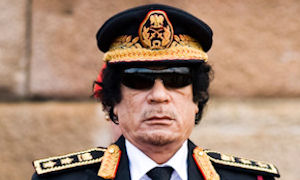By Pinhas Inbari
Libya without Muammar Gaddafi is a lot like Qatar without 'al-Jazeera'. Libya, left to its own devices, is a small country with little influence in the inter-Arab fabric. It was the charismatic personality of Muammar Gaddafi, and his life-long act in the international arena, first on the stage of global terror and during his alliance with the West against radical Islam, his colorful appearance and his 'green' ideology that gave Libya its added value. Now, upon his disappearance, Libya might return to its modest natural dimension as a desert state whose weight was not measured by the size of its leader, but by its strategic value to the West as an energy supplier.
 Gaddafi’s demise leaves the door open for the military commands of the rebels, who are actually mujahedeen, and for al-Qaeda operatives already operating freely in Libya. Thus, while the new emerging regime might cultivate closer ties with Europe due to the need to sell energy to the thirsty continent, it may also leave a wide berth for al-Qaeda to operate either inside or outside the administration, or both. One of the questions that needs to be raised is whether we are in fact in a post-Gaddafi era, or only in another stage of his colorful career, one that may even be more dangerous than that of his overt leadership. Much depends on whether he is caught. If captured, Libya, the Middle East and the world at large will be spared a looming threat. Should the colonel go underground, everyone must brace for his revenge.
Gaddafi’s demise leaves the door open for the military commands of the rebels, who are actually mujahedeen, and for al-Qaeda operatives already operating freely in Libya. Thus, while the new emerging regime might cultivate closer ties with Europe due to the need to sell energy to the thirsty continent, it may also leave a wide berth for al-Qaeda to operate either inside or outside the administration, or both. One of the questions that needs to be raised is whether we are in fact in a post-Gaddafi era, or only in another stage of his colorful career, one that may even be more dangerous than that of his overt leadership. Much depends on whether he is caught. If captured, Libya, the Middle East and the world at large will be spared a looming threat. Should the colonel go underground, everyone must brace for his revenge.
Gaddafi’s roots are steeped in the Bedouin tradition of vengeance. He also has at his disposal almost endless resources in cash. Last weekend, the former governor of Libya told the satellite news channel 'Russia Today's Arabic service that prior to his disappearance he took much of the gold deposits from the bank’s vaults. This, combined with his personal familiarity with the labyrinth of global terror and his large web of international connections, may spawn a new Gaddafi, who, in some aspects, is more dangerous than Osama Bin Laden, provided that he is well hidden.
Will Gaddafi join hands with al-Qaeda? Both have a shared hatred of the West and the ousted Libyan leader has been known to suggest that he might ally with the terrorist organization. It is this writer’s opinion that such an alliance is unlikely. Firstly, Gaddafi will probably not rush to ally with his archenemy. Furthermore, his theatre of political operation and connections contradict this above-mentioned alliance. Qaddafi’s natural allies in the Arab world are Algeria and Syria, states that both struggle internally with al-Qaeda and Salafist groups. In order to keep his alliances alive, he will share his anti-Qaeda sentiment and information with them.
It is possible that Qaddafi, or more likely some of his family, will find refuge in one of the radical states in South America, where he has already been invited, and may even end up in Hugo Chavez’ Venezuela. Chavez’ country will provide an excellent alternative to Qaddafi’s family, who is used to a life of luxury it will be hard pressed to forego. Such a turn of events will naturally lead to Qaddafi becoming an active player in the radical Iran-Syria-Venezuela axis.
Who will the deposed despot target once in exile? His first target will of course be the new regime in Libya, whether or not it eventually includes an element of al-Qaeda in its administration. His targets in the Arab world will start with Qatar. Gaddafi already fired the first (foiled) shot at Qatar when trying to set off a bomb at the Qatari embassy in Tunis last weekend. States like Jordan and the United Arab Emirates also must be aware of Gaddafi’s potential schemes.
In the European arena, he will focus his attention on France, which he perceives as the bigger enemy. In Gaddafi’s view, he would have succeeded in crushing the rebels had it not been for President Nicolas Sarkozy’s triggering the decision to send NATO in to help the revolt. A smaller enemy is Great Britain who joined France in this adventure. However, Gaddafi reserves a special and separate grudge against Britain because she betrayed him and his heir apparent, Saif al-Islam, despite the special relationships he had developed with her politicians and leadership.
Post-Gaddafi Libya has a fair chance of becoming an ordinary country blessed with energy resources after it grapples with its significant domestic problems crowned by tribalism.
There are only two challenges that stand in its way: the potential threat of al-Qaeda from within and the vengeful arm of its former leader and his allies from without.








